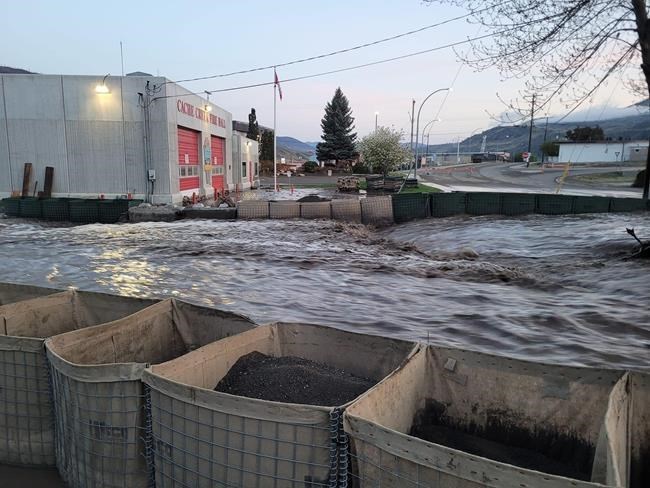CACHE CREEK, sa¹úŒÊŽ«Ãœ — Cache Creek Mayor John Ranta says flooding in the sa¹úŒÊŽ«Ãœ Interior town is already the worst he's seen in 50 years, and he's expecting even more trouble as blazing temperatures forecast this weekend hit the snowpack.
He said over 100 mobile homes perched on the banks of the Bonaparte River are at risk in the community, 350 kilometres northeast of Vancouver.
Ranta said the Sage and Sands Mobile Park had been evacuated of about 200 people, who had been sent to nearby Kamloops.
"The Bonaparte River was flowing at 100-year level yesterday, and there is still an awful lot of snow up in the hills and we are expecting 34-degree temperatures over the next couple of days," Ranta said in an interview on Wednesday.
More evacuation orders will be issued in the days ahead, he said.
The town is currently under a flood warning, with a state of local emergency extended until May 13.
The Thompson-Nicola Regional District also added an alert for at least one property five kilometres south of the village on Wednesday, asking residents to be ready to evacuate on short notice.
Last week, the rising waters flowed through Cache Creek's firehall, flooded several homes and businesses, and temporarily closed both highways 1 and 97.
The village says eight properties remain under an evacuation order from that deluge.
Provincial emergency officials have said that less rain than expected in the southern Interior last weekend stabilized the flood risk for a period, but forecasters warn the warm weather will likely trigger snowmelt and further threats.
The sa¹úŒÊŽ«Ãœ River Forecast Centre has issued a flood warning for the lower Thompson region, which includes the Bonaparte River and Cache Creek area.
The centre says the warm spell coming by Friday is expected to last through the weekend, raising the freezing level, melting mountain snowpacks and swelling waterways.
"People are upset naturally, that's only understandable," said Ranta of the flooding.
However, he added that most residents of Cache Creek were resilient.
"They recognize that it's not something that the village has done or failed to do. It's an act of God that is causing all this water to come down Cache Creek and the Bonaparte River, and we just have to manage the best that we can," said Ranta.
The flooding had destroyed the community hall’s parking lot and washed-out sidewalks, said Ranta.
The Todd Road Bridge across the river can’t be used because both ends have been eroded away, challenging commutes.
Ranta said what was a five-minute journey from his office to the post office now took an hour to drive.
"Probably it would have been faster to walk," said Ranta.
There have been uplifting moments, such as when a traveller gave birth in her car as she waited in a traffic lineup to Kamloops a couple of days ago.
“It was a baby girl and the ambulance got there just in the nick of time and the girl and the mother are doing well, apparently,” said Ranta.
The community of Grand Forks, 500 km east of Vancouver, also issued a state of local emergency last week due to flooding, but has started taking down some protections.
Officials said in an online statement that other measures will remain as they monitor the forecast.
In the Regional District of Kootenay Boundary, which includes Grand Forks, some evacuation orders have been downgraded due to receding waters, and only nine properties in the area remain under evacuation orders.
Kevin Skrepnek, manager of community and emergency services with the Thompson-Nicola Regional District, said in a statement that it has never been more important for residents to be prepared, given the flooding across the region.
The statement said the local emergency operations centre has been activated in response to wildfires and flooding across the region.
This report by The Canadian Press was first published May 10, 2023
The Canadian Press



